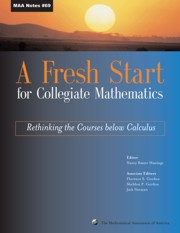Book contents
- Frontmatter
- Preface
- Contents
- Introduction
- Background
- Theme 1 New Visions for Introductory Collegiate Mathematics
- Theme 2 The Transition from High School to College
- Theme 3 The Needs of Other Disciplines
- 16 Fundamental Mathematics: Voices of the Partner Disciplines
- 17 Skills versus Concepts at West Point
- 18 Integrating Data Analysis into Precalculus Courses
- Theme 4 Student Learning and Research
- Theme 5 Implementation
- Theme 6 Influencing the Mathematics Community
- Ideas and Projects that Work: Part 1
- Ideas and Projects that Work: Part 2
18 - Integrating Data Analysis into Precalculus Courses
from Theme 3 - The Needs of Other Disciplines
- Frontmatter
- Preface
- Contents
- Introduction
- Background
- Theme 1 New Visions for Introductory Collegiate Mathematics
- Theme 2 The Transition from High School to College
- Theme 3 The Needs of Other Disciplines
- 16 Fundamental Mathematics: Voices of the Partner Disciplines
- 17 Skills versus Concepts at West Point
- 18 Integrating Data Analysis into Precalculus Courses
- Theme 4 Student Learning and Research
- Theme 5 Implementation
- Theme 6 Influencing the Mathematics Community
- Ideas and Projects that Work: Part 1
- Ideas and Projects that Work: Part 2
Summary
Introduction
The statistics education reform movement of the past fifteen years has emphasized genuine data, conceptual understanding, and active learning (see [3] and [9] for overviews). These features have also been hallmarks of calculus reform efforts, although the use of genuine data is naturally more prevalent in statistics courses than in calculus, for statistics has data analysis at its very core. Yet many calculus reform projects emphasize applications, which in turn often involve genuine data.
The articles in this volume reveal that these features, including the use of real data, are prominent in the call for rethinking precalculus courses as well. Indeed, Gordon uses college enrollment data to support his argument that students should analyze real data in preparation for calculus [6]. Examples of precalculus books that feature genuine data prominently include Gordon et al.'s Functioning in the Real World: A Precalculus Experience [7], Connally et al.'s Functions Modeling Change: A Preparation for Calculus [4], and Swanson et al.'s Precalculus: A Study of Functions and Their Applications [14]. All three of these texts present many examples of real data for students to analyze.
Data analysis plays an even larger role in an earlier book: Barrett et al's Contemporary Precalculus: Functions, Data Analysis, and Matrices, written by faculty of the North Carolina School for Science and Mathematics and aimed for a high school audience [2]. This book introduces data analysis in its very first chapter, while the central concept of function waits until the second chapter to make its appearance.
- Type
- Chapter
- Information
- A Fresh Start for Collegiate MathematicsRethinking the Courses below Calculus, pp. 169 - 178Publisher: Mathematical Association of AmericaPrint publication year: 2006

